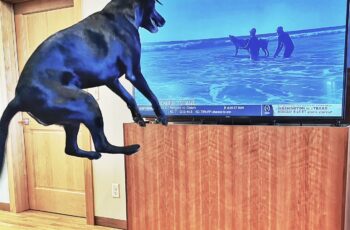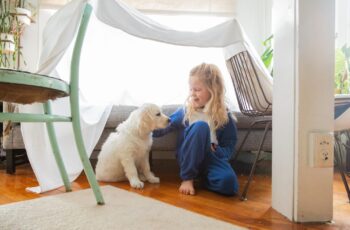Dog Odor by Janice Jones |Last Updated 06-07-2022
Love those four-legged friends but not a fan of the dog odor that accompanies our companions? Our homes feel clean if they are odor free but sometimes that doggie odor gets overwhelming.
I totally understand.
How do we have a clean house and cohabit with a couple four-legged kids? Luckily it is not as difficult as you might think.
According to the National Center for Health Research, companion
animals help to improve health by lowering blood pressure levels and regulating
the heart in the event of stressful situations.
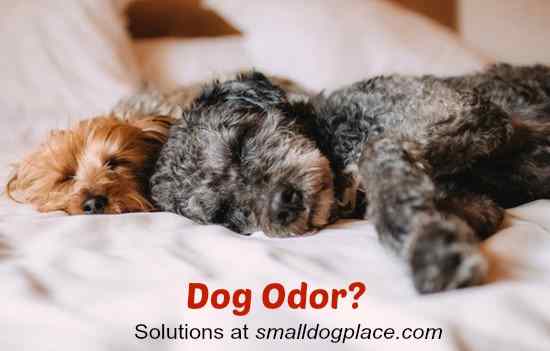 Dog Odor Problems Come From Surprising Sources
Dog Odor Problems Come From Surprising SourcesFamily pets promote an active lifestyle among kids as they spend time playing
inside the house or in the yard.
While pets are a welcome addition to homes,
they also add to the cleaning routines with the most notable problem being
their odor. When kicking the bad pet odor out of your house, these are the
things to know:
Identify the Source of the Dog Odor
The first order of business in dealing with pet odor in the house is
identifying the source of the smell.
Pet odor arises from habits like
lying in
excrement, rolling in the mud or dead animal remains. The smell can also
emanate from simple routines like bathing then forgoing drying.
Microorganisms thrive in the fur of animals like dogs and cats. There is hardly
any smell as long as the animal stays dry, but once the dog takes a bath or
dives into the pool, the water releases these sticky compounds leading to an
awful stench.
Mouth odors can be a
sign of infection inside the mouth, and this smell can linger in the home for
days.
Some breeds like Bulldog or Pugs are prone to skin fold dermatitis that
cause foul odor underneath the folds.
Bacterial and yeast infections are other
sources of the bad smell that quickly spreads in a home if the animal is
allowed indoors, particularly in close quarters like apartments.
There are cases that
my dog brings his food
to another room and just leaves it here.
Therefore, try to avoid this bad habbit by just feeding your dogs at some location in the house.
Summary of All Those Nasty Odors
Where do we find all those odors?
- From the dog, odors can come from:
- Dog Hair and skin including between skin folds that harbor fungus and bacteria
- Dog Urine, Dog Excrement, hidden from view
- Other body secretions including Sweat glands
- Unaltered male and female hormone releases
- Dog Ear Infections
- Mouth odors due to Gingivitis and periodontal disease
Tips to Eliminate Dog Odor
Regular Baths
Since we have established that pets are mostly responsible for the bad scent
they leave behind, it is imperative that you observe a consistent cleaning
habit to keep the animal as clean as possible.
Animals love to play
in the mud during the rainy seasons so you may have to wash them more often
than in the dry season. Alternatively, you can control their playing habits by
sequestering them to a corridor or other empty room in the house as opposed to
playing in the yard.
Clean Sleeping Area
Bathing your pet should go in tandem with cleaning up their sleeping area. Make
a habit of inspecting the dog kernel several times through the week to see if
they have created a mess.
When this happens, take out the soiled bedding for
cleaning or drying in the outside if the weather allows.
You can also hand wash the blankets by first soaking in hot water to kill
pathogens followed by air drying.
To make your work easier, use removable
covers so that you can replace with a clean one pending laundry.
Vacuum the bed
to remove hairs, fur, and other debris that may have transferred from the
environment.
Check for Problems
Skin
Allergies that affect the skin including skin fold dermatitis can create odors that spread beyond the dog. If there are odors that can’t be identified, first check the skin and coat to determine if there is redness, inflammation or a rash that might be at the heart of the odor.
Even dogs that do not have allergies may have body odor from dirty hair, tear stains or facial stains that occur due to wet whiskers and beards. Food can get tangled in long breed dogs’ facial hair and yeast infections can create odors as a result of tear stains.
Ear Infections
Dogs that have severe ear infections can give off a severe odor. Cleaning ears and treating the infection will help remove some of those odors.
Dog Paws and Foot Pads
A dog’s paws are the only area on their body with sweat glands. If the dog’s odor seems to be coming from the paws, check them carefully. Infections, foreign objects or matted hair between the paw pads can cause odor.
If you suspect an infection, call the vet for directions. If it is a matter of matted hair embedded between the pads, removing the mats and hair will help but need to be followed by a thorough paw soaking and cleaning
Dental Issues
Bad breath is hard to ignore and dogs that have dental issues are prime candidates for bad breath. It is also very easy to identity. If those doggie kisses smell uckie, it’s time to set up an appointment for a professional dental cleaning and dentistry by your veterinarian.
A mild odor can sometimes be treated at home by brushing daily to remove the tartar and plaque build up.
Overall Doggie Odor
Some breeds just seem to have more doggie odor than others. This is especially noticeable when the dog comes in wet from outside. These breeds may need more baths if their odor becomes a problem
Females in Heat
There is definitely an odor that female dogs in heat emit that is noticeable to male dogs. Did you know that people can also detect that odor? Diapers and daily cleaning can cut down on that odor may help.
Homemade Cleaning Solutions to Eliminate Dog Odor
Cleaning up after pets does not have to make a dent in your monthly budget.
There are plenty of solutions that you can make using common ingredients used
in homes.
For instance, white vinegar is a natural deodorizer and has proven
performance in removing urine stains on the carpet. Spraying a combination of
vinegar and baking soda helps to remove any lingering smell of urine after the
deep cleaning process.
Try this formula by mixing equal parts of white vinegar and lukewarm water in a
pot or bowl. Add four tablespoons of baking soda and pour the mixture into a
spray bottle. Shake thoroughly to allow blending before use.
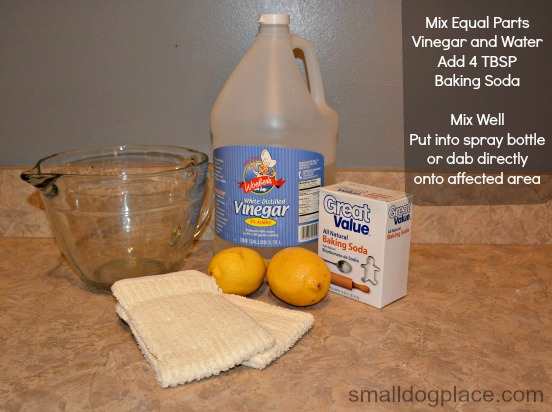 Dog Odor Issues Can be Eliminated Using Simple Household products
Dog Odor Issues Can be Eliminated Using Simple Household productsYou can also use
solutions from citrus fruits like lemon, orange, and grapefruit to get rid of dog odor. If family pets
wreck havoc on the carpet, cut a lemon in half and dab gently on the rug to
remove urine stains.
Designated Play Areas
If the bad odor persists even after washing the animals regularly, it is time
for more stringent measures like setting up a designated play area where the
kids can interact with family pets while barring access to other rooms such as
the living room and bedrooms.
This restriction helps you to know when and where the mess occurs so you can clear it
without wandering around the house to identify the source of offensive smells.
If you have a basement, ensure that the door stays shut to keep pets away as
they may accidentally potty here without your knowledge.
Pin for Future Reference
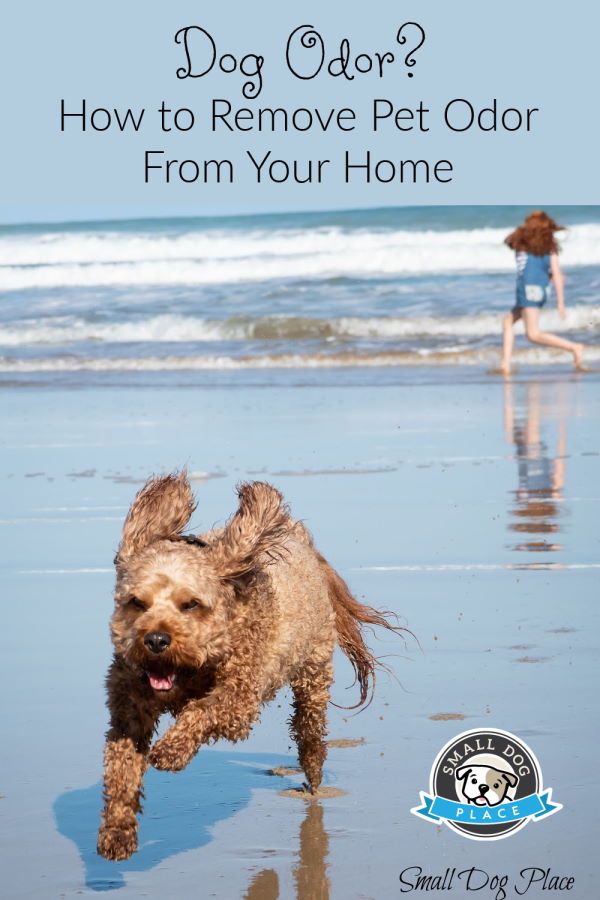
Conclusion
Getting rid of pet odor from the house requires a combination of washing pets,
airing the bedding, and rules to contain physical activity within a given area.
If your budget is tight, homemade solutions can help remove stains on the
upholstery or rug.
Does This Article Deserve Your Thumbs Up?
We always appreciate your support and encouragement. Your thumbs up means so much to us. Please like this article.
If you find this page or any page on Small Dog Place Helpful, or Useful in anyway, I’d love it if you would click the small heart found on the bottom right of each page.
You can also share or bookmark this page — just click on the:

Free Monthly Newsletter
Sign Up for Our Free Newsletter and get our Free Gift to You.
my E-book, The Top 10 Mistakes People Make When Choosing a Dog (and how to avoid them)

